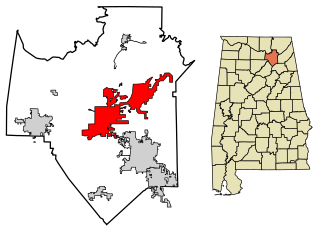
Guntersville is a city and the county seat of Marshall County, Alabama, United States. At the 2020 census, the population of the city was 8,553. Guntersville is located in a HUBZone as identified by the U.S. Small Business Administration (SBA).

Jean-Pierre Boyer was one of the leaders of the Haitian Revolution, and the president of Haiti from 1818 to 1843. He reunited the north and south of the country into the Republic of Haiti in 1820 and also annexed the newly independent Spanish Haiti, which brought all of Hispaniola under one Haitian government by 1822. Serving as president for just under 25 years, Boyer managed to rule for the longest period of time of any Haitian leader.

Muzak is an American brand of background music played in retail stores and other public establishments. The name Muzak, a blend of music and the popular camera brand name Kodak, has been in use since 1934 and has been owned by various companies. The word Muzak has been a registered trademark of Muzak LLC since December 21, 1954.

Leo Calvin Rosten was an American writer and humorist in the fields of scriptwriting, storywriting, journalism, and Yiddish lexicography.

A coffin ship is a popular idiom used to describe the ships that carried Irish migrants escaping the Great Irish Famine and Highlanders displaced by the Highland Clearances.

Norwegian Americans are Americans with ancestral roots in Norway. Norwegian immigrants went to the United States primarily in the latter half of the 19th century and the first few decades of the 20th century. There are more than 4.5 million Norwegian Americans, according to the 2021 U.S. census; most live in the Upper Midwest and on the West Coast of the United States.

Jonathan Mark Hamilton Priaulx Raban was a British award-winning travel writer, playwright, critic, and novelist.
Snakeheads are Chinese gangs that smuggle people to other countries. They are found in the Fujian region of China and smuggle their customers into wealthier Western countries such as those in Western Europe, North America, Australia, and some nearby wealthier regions such as Taiwan and Japan.
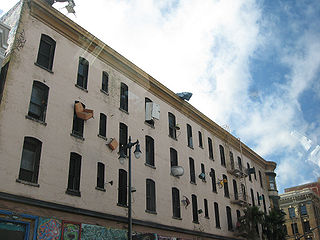
Single-room occupancy (SRO) is a type of low-cost housing typically aimed at residents with low or minimal incomes, or single adults who like a minimalist lifestyle, who rent small, furnished single rooms with a bed, chair, and sometimes a small desk. SRO units are rented out as permanent residence and/or primary residence to individuals, within a multi-tenant building where tenants share a kitchen, toilets or bathrooms. SRO units range from 7 to 13 square metres. In some instances, contemporary units may have a small refrigerator, microwave, or sink.

Charles Anthony D'Ambrosio, Jr is an American short story writer and essayist.

Grosse Isle is an island located in the St. Lawrence River in Quebec, Canada. It is one of the islands of the 21-island Isle-aux-Grues archipelago. It is part of the municipality of Saint-Antoine-de-l'Isle-aux-Grues, located in the Chaudière-Appalaches region of the province.
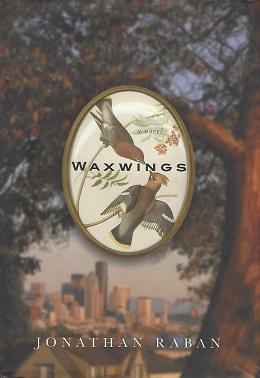
Waxwings 2003 is the second novel by Jonathan Raban
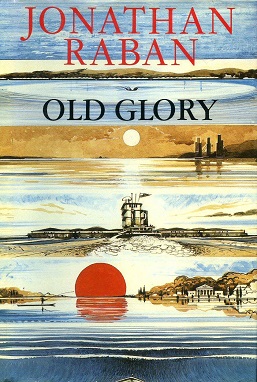
Old Glory is a travel book by Jonathan Raban. It is the winner of The Royal Society of Literature's Heinemann Award and the Thomas Cook Travel Book Award.

Bad Land: An American Romance is a travelogue of Jonathan Raban's research, over a two-year period, into the settlement of southeastern Montana in the early 20th century. The focus of the book is one of the least-populated areas of the United States – the badland area between Marmarth, North Dakota, and Terry, Montana, along the route of the Milwaukee Road railroad and the goings on of various settler families who homesteaded in that area. Emigrants came from Britain, Scandinavia, Russia and Germany in search of a new life in the New World. Nowadays, their ruined houses still stand among forlorn fenceposts trailing whiskers of rusty barbed wire in the arid landscape of eastern Montana, dotted with low buttes and scored with dry creek-beds. The settlers attempted to build a hopeful civilization on the prairie, only to see it collapse within little more than a decade during the time of the Dirty Thirties.
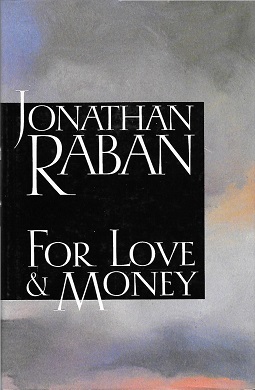
For Love & Money: Writing, Reading, Travelling, 1968 - 1987 is a book by Jonathan Raban. As the author states in the opening chapter, it is partly a collection of case-histories of his writing career over twenty years as a professional writer.

In 1818 the Red Star Line was founded by Byrnes, Trimble & Co. from New York.. On September 11, 1835 the line was bought by Robert Kermit from New York, a ship-owner and agent for packet ships, and was renamed Robert Kermits Red Star Line. In 1851 Robert Kermit took his brother-in-law Charles Carow into partnership as Kermit & Carow to carry on the business of general ship owning, commission and commercial trading. Robert Kermit died in 1855 and Carow assumed the business. In 1867 the Red Star Line went down.
Margaret McCarthy was an Irish migrant to the United States.
The typhus epidemic of 1847 was an outbreak of epidemic typhus caused by a massive Irish emigration in 1847, during the Great Famine, aboard crowded and disease-ridden "coffin ships".
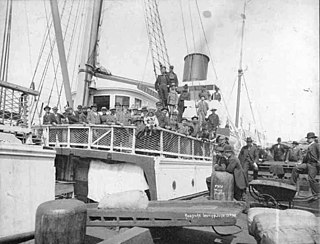
SS Roanoke (1882–1916) was a passenger and cargo ship built by John Roach & Sons in Chester, Pennsylvania. The Roanoke was built for the Old Dominion Steamship Company's service from New York to Norfolk Virginia. In 1898 the ship was sold to the North American Transportation and Trading Company to take miners, supplies and gold between Seattle and ports in Alaska. Later the Roanoke was sold to the Oregon-based North Pacific Steamship Company. In 1907, the Roanoke helped to rescue the survivors of her former running mate Columbia. On May 9, 1916, the Roanoke sank in heavy seas off the California coast near San Luis Obispo with the loss of 47 lives. There were only three survivors.

Emerich Juettner, also known as Edward Mueller or Mister 880, was an Austrian-American immigrant known for counterfeiting United States $1 bills and eluding the United States Secret Service for a decade, from 1938 to 1948. When caught, he openly admitted his actions, adding that he had never given more than one bill to anyone, so no person had lost more than one dollar. He was sentenced to one year and one day in prison and a one-dollar fine, and he later sold the rights to his story, which was made into the 1950 film Mister 880.
















